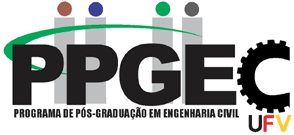Impact
Scientific production with international recognition
The PPGEC has stood out for the high quality and originality of its intellectual output. The most cited articles during the four-year period, all published in A1-ranked journals, address innovative topics such as alkali-activated materials using sustainable activators, the use of steel slags and nanomaterials in cement-based composites, the production of bioproducts from microalgae, and the development of cement-based sensors. These studies show strong alignment with the Program’s research areas and attract considerable academic and technological interest, with potential impacts on environmental sustainability, energy efficiency, and the circular economy.
Concrete contributions to public policy
The Program has played a key role in the execution of large-scale projects with national reach, such as RADIS and AMARIS. RADIS carried out numerous technical visits to rural settlements, contributing to environmental and land regularization and providing technical support to INCRA. AMARIS, in turn, focuses on collecting and validating socioeconomic data from approximately 20,000 families in the Legal Amazon, supporting land titling and integration into public policy programs. Both initiatives highlight the Program’s impact on territorial development, legal security, and social justice.
Technological development and modernization of national infrastructure
Through its partnership with DNIT, the PPGEC has contributed to the implementation of Building Information Modeling (BIM) in the management of special civil structures. This initiative led to the creation of the BIM Laboratory, the development of tools for automated structural analysis, and the training of highly qualified professionals. These advancements support the modernization of national infrastructure and foster more efficient and sustainable practices in the transportation sector.
Risk prevention and climate change adaptation
The Program has played a significant role in reducing urban risks and responding to environmental disasters. Projects involving Municipal Risk Reduction Plans and AI-based mapping tools have enhanced the ability of cities to respond to floods, landslides, and extreme events. These efforts contribute to safer and more resilient cities, aligned with global climate adaptation goals.
Innovation and sustainable solutions in civil construction
PPGEC’s activities in construction materials and components combine technological innovation with environmental responsibility. Research on eco-efficient concretes, reuse of industrial waste, sustainable paints made from ornamental stone residues, and the development of low-impact products are among the highlights. The Prototyping and Testing Center strengthens this effort by bridging academic research with startups and entrepreneurs, fostering innovation and the development of technological solutions for the construction industry.
Applied research in sanitation and the bioeconomy
Projects developed by the Program explore the use of microalgae in biorefinery systems for the production of biofertilizers, bioenergy, and bioproducts. These studies combine environmental sustainability with resource recovery and circular economy principles while proposing low-cost technologies for wastewater treatment. Supported by national and international partnerships, these initiatives position PPGEC as a reference in the integration of environmental engineering and biotechnology.
Professional training and direct social impact
The Program has created training opportunities, scholarships, and technical education for dozens of students. Participation in capacity-building courses on risk management, extension projects such as Colorindo, and technical assistance to low-income communities demonstrate that PPGEC’s impact goes beyond research, directly contributing to improved housing conditions, social equity, and the reduction of inequalities.
Commitment to the Sustainable Development Goals (SDGs)
The Program’s actions and research are strongly aligned with the United Nations 2030 Agenda and its Sustainable Development Goals. Key goals addressed include poverty eradication, sustainable agriculture, gender equality, clean water and sanitation, clean energy, decent work, industrial innovation, sustainable cities, responsible consumption, and climate action. This alignment underscores the strategic relevance of the Program and its capacity to contribute to global challenges through science and technology.
Conclusion and future perspectives
The set of actions and results achieved by PPGEC demonstrates not only its scientific and technological maturity but also its commitment to sustainable development and social transformation. Its high-impact intellectual production, combined with the execution of strategic projects in collaboration with public agencies and national and international institutions, highlights the Program’s ability to integrate applied research, qualified training, and innovation with real-world impact. Looking ahead, PPGEC aims to further explore emerging technologies, strengthen knowledge transfer to the productive sector, enhance its contributions to public policy, and consolidate itself as a center of excellence in sustainable solutions for civil and environmental engineering challenges.
